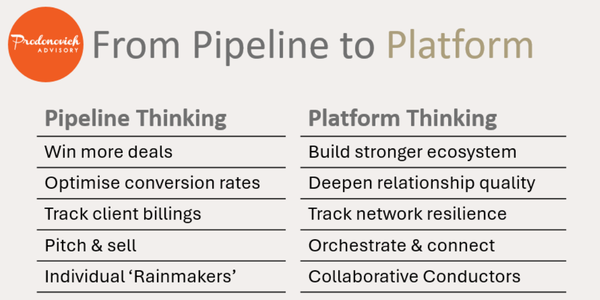The Key To Successful Practice? Stop Focusing on Winning Work
In Brief: Platform vs Pipeline Business Development
Instead of focusing solely on winning work (pipeline thinking), successful professional services practices build platforms - creating ecosystems of relationships where work flows naturally from genuine value creation.
Three shifts to make:
From transactional sales → relationship orchestration
From optimizing processes → deepening quality interactions
From tracking client value → measuring ecosystem resilience
This platform approach increases practice resilience and reduces reliance on constant pitching and conversion activities.
The most common question professionals ask me is, ‘how do I win more work’? The answer I usually give them - and one which doesn’t always go down well - is to stop thinking about winning.
To this end, I was intrigued by this Harvard Business Review article that suggested the key to creating a resilient business was to build a platform rather than a pipeline.
Pipeline businesses, the authors explained, create value by controlling a linear set of activities - inputs go in one end, get transformed and come out as something different.
Platform businesses, on the other hand, “bring together producers and clients in high-value exchanges”. “Their chief assets are information and interactions, which together are also the source of the value they create and their competitive advantage,” the article said.
To illustrate this point, the authors noted that when Apple launched its iPhone in 2007, five manufacturers - Motorola, Nokia, Samsung, Sony Ericsson and LG - accounted for 90% of the industry’s total profits. By 2015, Apple single-handedly generated 92% of global mobile phone-related revenue. That same year, four of the five previous incumbents made no profit at all.
The authors opined that the reason for Apple’s success was that it broke away from the pipeline model of selling iPads and iPhones and moved towards the platform model, where developers built apps and mobile phone users consumed them - although they acknowledged that Apple still straddled both camps, as many professional services firms do.
Two Approaches to Building a Professional Services Practice
What does this have to do with professional services firms?
The answer is pretty much everything.
Professional services practices that follow the pipeline model tend to be transactional. They focus on winning new work through sales, pitching and conversion.
Platform-based practices, on the other hand, focus on relationships within the market (or within a big client organisation). They don’t think only about the deal or transaction, but about how they can add value to their clients in everything they do. They know that by thinking holistically and giving clients what they need to connect the dots, the work naturally falls their way, and sales become less critical. They know the rainmaker is dead.
That said, as with mobile phones and tablets, there are few pure platform models for law and accounting firms. Virtually all are made to respond to RFPs (very pipeline) and to pitch for other work too.
However, I would encourage your practice to start thinking platform rather than pipeline. Here are four ways to do that…
1.From a Service Provider to Orchestra Conductor
As the trusted adviser to your clients, you’re in a unique position. You get to see your client’s business from the inside out. But you also get to see the marketplace - or many marketplaces - from an independent position, something your clients don’t have the luxury of.
Use your position to orchestrate expert resources. Introduce your clients to the people you know, provide intelligence where you can, and have your firm leadership become a conductor of talent rather than a player in the pit. By genuinely collaborating and sharing knowledge, you’re providing your clients with a level of competitive advantage other professionals probably aren’t.
2. From Precedents to Ecosystem as core Asset
Ask a lot of professionals what their firm’s assets are, and they’ll think of the people and precedents. I’d encourage you to look beyond that to the community you influence and contribute to. Others won’t be able to easily replicate the relationships and reputation you’ve built; precedents and people are much easier to get hold of.
When you think this way, you’ll shift your focus from optimising time and processes (pipeline activities) to having deep, quality interactions with clients, experts, suppliers and intermediaries. Get to know the networks of your clients and the other providers they work with and introduce them to the suppliers to your firm.
3. From Client Value to Ecosystem Resilience
Finally, instead of focusing on the value of your clients (and how much work they bring in), start focusing on the value of your ecosystem – i.e., how it’s growing and how dependable and resilient it is.
You can do this by tracking your work origination sources now to figure out exactly how you attract work. Then plan how you’ll build your ecosystem and cultivate a network relevant the three horizons of your career - short term, medium term and long term.
Remember, the best referral relationships are low maintenance and offer high value from both ends. These are the ones you should be looking for.
More importantly, if you’re a less experienced professional, you should be looking to build these networks from day one. Don’t wait until you’re a senior associate or senior manager knocking on the door of partnership. By then your job will be much harder.
In short, remember that building a platform-based practice means investing in authentic relationships across different networks, from the beginning of your career.
Want more?
If you’d like to know more about how to build a successful practice, get in touch.
References and Further Reading
Deeb G (2021) Business Lessons From The Great Conductors, Forbes
Stoke J & Dobson S (2020) From Ego to Eco: Leadership for the Fourth Industrial Revolution, Oxford University’s Said Business School
Van Alstyne M W, Parker G G, & Choudary S P (2016) Pipelines, Platforms, and the New Rules of Strategy, Harvard Business Review Magazine
Ray D’Cruz, Performance Leaders, interview with Mark Rigotti, Global CEO, Herbert Smith Freehills (2021) – discussion about rewarding collaboration at 9:46mins (transcript)
Sue-Ella’s articles
§ How Good Are Your Networks? Are Your Connections Really Valuable or Are They Holding You Back?
§ How to Repay a Referral When you Can’t Refer Back
Sue-Ella is the Principal of Prodonovich Advisory, a business dedicated to helping professional services practices sharpen their business development and client engagement practices.
She works primarily with law and accounting firms on Business Development strategy and support structures, leadership and professional-development programs, and designing client-listening initiatives.
She also co-facilitates firm planning retreats and delivers private and public workshops such as Business Skills for Lawyers.
Through her BD45™ service, she assists individuals with their personal business-development plans.
Connect on LinkedIn
©Prodonovich Advisory. This article was written by a human. Please respect our copyright and the effort taken to produce the original material in this article. This article, and any portion of it, may not be reproduced or used in any manner whatsoever without the express written permission of the author.


